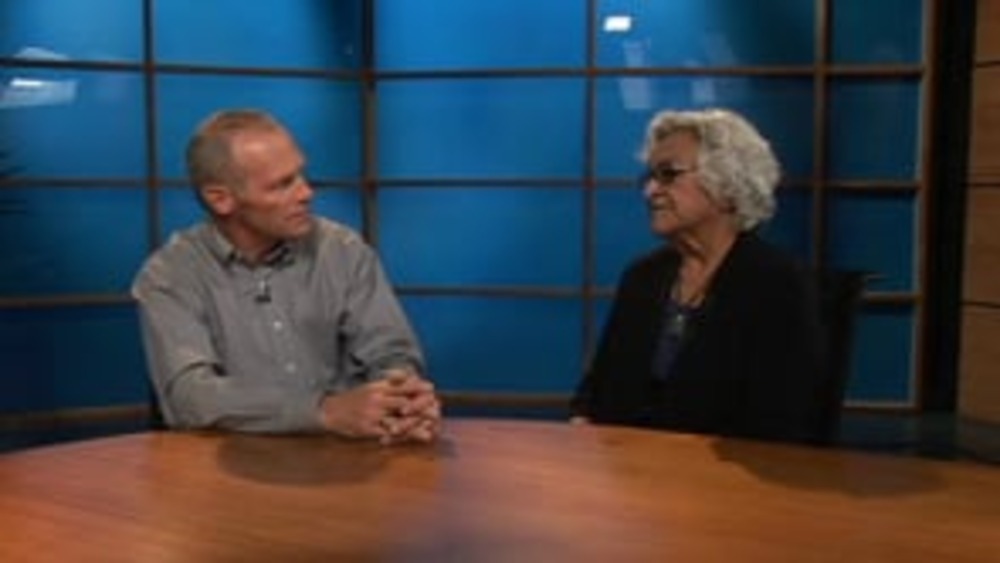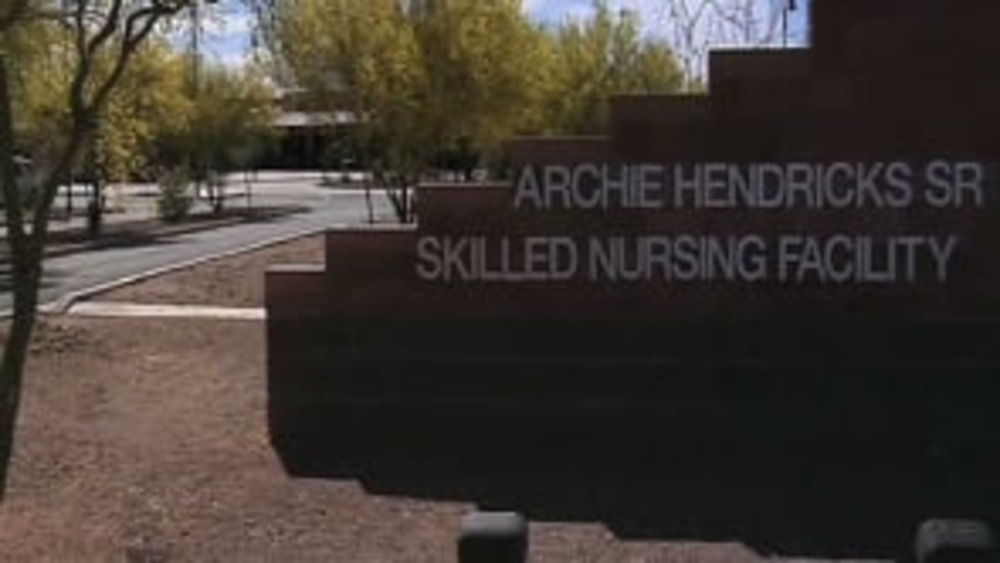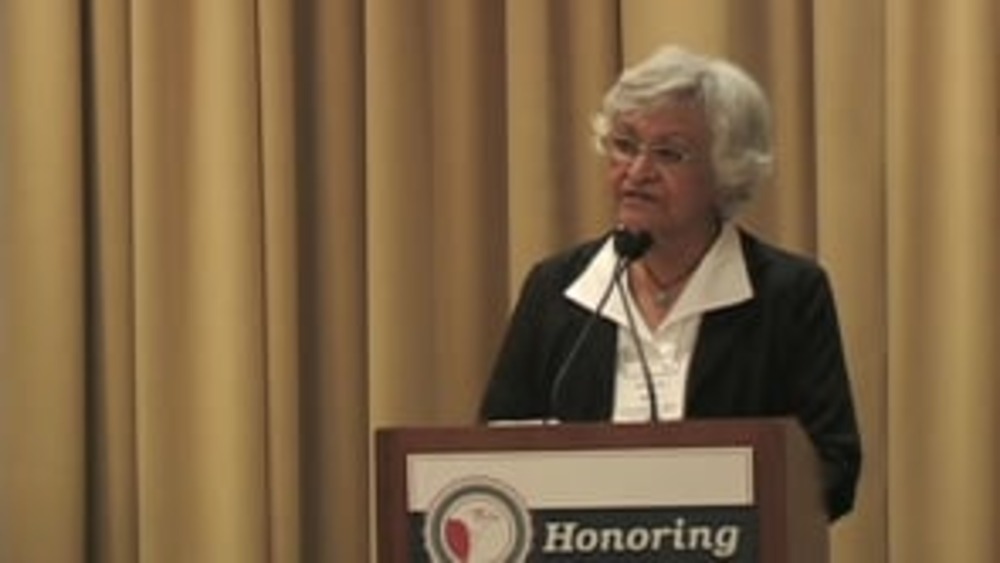Frances Stout, Chairperson of the Tohono O'odham Nursing Care Authority, shares the inspiring story of the Tohono O'odham Nation's state-of-the-art elder care facility.
Additional Information
Stout, Frances. "Archie Hendricks, Sr. Skilled Nursing Facility and Tohono O'odham Hospice." Honoring Nations symposium. Harvard Project on American Indian Economic Development, John F. Kennedy School of Government, Harvard University. Cambridge, Massachusetts. September 16-18, 2009. Presentation.
Transcript
"Good afternoon. My name is Frances Stout and I'm Chairperson, as she said, of the Tohono O'odham Nursing Care Authority, which is the governing body for the Archie Hendricks Skilled Nursing Facility and the Tohono O'odham Hospice, which are both located on our Tohono O'odham Nation. First we wish to thank Harvard Honoring Nations for the privilege of telling our story. Harvard's program motivated us to ask ourselves, 'What worked and why?' We hope that parts of our story will resonate with you today.
Let me begin by telling you a little bit about our Nation. It is the second-largest tribe in Arizona as measured by population and its geographic size. There are approximately 29,000 enrolled members and of these, 15,000 reside on the Nation. The Nation is comprised of four reservations which total about 2.8 million acres, about the size of Connecticut. Our elder population number around 4,000. These are elders over 55 years of age. Some speak only O'odham, which is our Native language. Others have strong -- most of them have strong cultural ties and strong family ties. Many are active in the workforce and some in tribal leadership. Our Nation suffers from chronic diseases that interfere with quality of life. Fifty-eight precent live with onset adult diabetes, 63 percent have been diagnosed with high blood pressure. These figures were compiled from the tribal health department in 2002 on elders who were 60 years and older. In addition, the survey reported that 8 percent of the surveyed population felt depressed all or most of the time and that 11 percent considered their health status poor.
The Nation does not have sufficient housing for its membership, and this makes it very difficult to care for the elder at home. Other issues of the O'odham elder include lack of transportation, social service, and home-based health services. In addition, there is elder abuse. However, our Nation has enacted an Adult Protection Services, an ordinance which has improved the situation. Our facility is a shelter for the elders for this program. Until the opening of our skilled care nursing facility and hospice, there were no long term care services on the Nation. Does this all sound familiar? I think all of us can in one way or another relate to some of these issues. And in your program, I think it described it as an endless cycle of poverty and social distress. But I also remember what Oren said, 'What happens to us is in our hands.' So this is pretty much how we work, what we were thinking when our program came into being. About 10 years ago, the elders who needed long-term care had to be sent away to neighboring cities. This was very painful for everyone. The families reported when they returned from visiting that their loved ones were in worse shape. They were not eating because the food was foreign, they were not speaking because the language was foreign and they wanted to come home. This outcry began the process to bring our elders home. An advisory group worked for about a decade to realize the dream of having our own skilled nursing facility. On November 17th, 2003, we opened the doors of Archie Hendricks, Sr. Skilled Nursing Facility. It is now home to 60 elders. In 2007, our hospice program began.
Our facility, the Archie Hendricks Skilled Nursing Facility, is a state-of-the-art facility. The design includes large social areas for gathering and community activities. We also respond to our cultural needs by a separate healing room for our residents and medicine people. Critical to the quality of care provided to our people, is the quality of professional staff. The board believed that a combination of highly trained staff and sufficient staff to provide care would result in a higher quality of care. We established a ratio of one certified nursing assistant for every five residents. Our facility currently employs 135, of whom 80 percent are O'odham or Native American. Our turnover rate is less than 2 percent. This compares favorably to any jurisdiction. For example, the annual turnover rate for certified nursing assistants within the state of Arizona is 84 percent. We believe our strategy, staffing strategy, was and is effective as evidenced by our receipt of a five-star rating from the Centers of Medicare and Medicaid. The awards that this facility has received speak for the caliber of our staff. In 2009 our facility received, as I said, from the Centers of Medicare and Medicaid, a five-star rating. This is based on positive results of an annual federal inspection. Superior staffing and positive performance reflected in the key quality indicators. Only 14 percent of homes in the United States receive five stars. We are a finalist in A Winning Workplace. This is a small business award from The Wall Street Journal, businesses that provide competitive wages, superior benefits, opportunities for growth and development, opportunities for training and education. This describes our facility. Tucson Indian Health Service awarded us the Area Director's Award. The Tucson Indian Health Service director selects programs, services and individuals who have partnered with and enhanced the healthcare in the service area. The National Indian Health Board awarded us the Local Impact Award. Selections for this award is based on, as the word implies, a health program that has impact on the health and well being of Native Americans at the local level. And of course in 2008, we received highest honor awards from Honoring Nations. This award, as you all know, is based on successful contribution toward Native American self-determination, economic development and tribal sovereignty.
A little bit about our governance; two things that we are very, that we feel are very important. One is that we have to know who we are. We identify ourselves -- and we do this every time we present to our council or to our villages -- because once they know who we are and we do this over and over again, once they know who we are they began to trust us and when we bring new programs or come for requests, they know that we know who we are and that we know what we're asking for. The other thing is our purpose. A purpose tells us where we're going and this is something that I think the board feels is very important because the leadership, we are responsible for the continuum of care of people on our Nation. We operate the skilled nursing care facility and hospice. Our charter established and approved by our Nation's government provides substantial independence to the seven-member board. Our board is comprised of tribal leaders with relevant professional and technical knowledge in nursing, business and care giving. In addition to providing policy direction, we insure our cultural values. O'odham Himdag is part of all that is done within our service. In creating TONCA, the Nation directed us to take a leadership role in providing a continuum of care and services to meet the changing needs of our aging population. To establish this mission, the TONCA board invests in projects and programs that will bring value in the future.
In closing, we do strategic planning for the facility, but it is now apparent we need to connect, communicate and collaborate with other entities on the Nation that are charged with responding to the growing social and health needs of our Nation. We are convinced that we will have better coordination and reduce fragmentation of the services that currently hinder the provision of services to the aging O'odham population.
Thank you."



